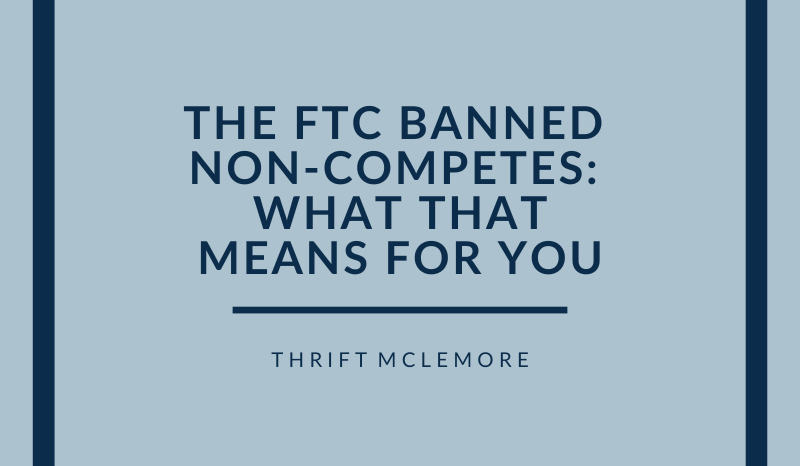The Federal Trade Commission (FTC) banned non-compete agreements nationwide earlier this year. What does this mean for employees and employers?
Before we analyze the FTC’s ruling, let’s revisit the basics of a non-compete agreement.
What is a Non-Compete Agreement?
A non-compete agreement creates a contractual relationship between an employer and employee, restricting the employee from working for a competitor or starting a competing business for a specified period or within a defined geographic area after leaving the current employer.
Example:
John signed a contract to work for Company A, a medical sales company based in Marietta, Georgia. Company A requires John to sign a non-compete agreement as part of the contract.
The non-compete agreement prohibits John from working for any other medical sales company in Marietta, Georgia for two years after John’s employment with Company A ends.
Under this non-compete agreement, John can seek employment with non-medical sales companies in Marietta or with medical sales companies located outside of Marietta.
What Does the FTC’s Ruling Say About Non-Compete Agreements?
The FTC’s recent ruling will effectively eliminate existing non-compete agreements and prevent future non-compete agreements.
However, existing non-compete agreements will remain in force for senior executives (defined under the new rule as workers earning more than $151,164 annually who hold policy-making positions).
Why Did the FTC Ban Non-Compete Agreements?
The FTC’s decision to ban non-compete agreements stems from a broader initiative to promote fair competition and protect workers’ rights. As part of this initiative, the FTC cited several key reasons to support the ban on non-compete agreements:
Enhancing Economic Mobility: Non-compete agreements severely restrict an employee’s ability to switch jobs, suppressing economic mobility. This ban will allow workers to pursue other opportunities and contribute dynamically to the economy.
Increasing Employee Wages: Non-compete agreements have also limited an employee’s earning potential. With the ban in place, the FTC anticipates an increase in the average worker’s earnings of at least $524 per year.
Encouraging Innovation: The FTC estimates that the ban will create more than 8,500 additional new businesses each year and increase the number of patents by 12,000 annually.
When does the FTC’s Ruling Take Effect?
While the FTC announced its final ruling on April 23, 2024, it published the rule in the Federal Register on May 7, 2024. Because the rule does not take effect until 120 days after publication in the Federal Register, employers have until September 4, 2024 to comply with the new rule.
The effective date may be delayed if legal challenges to the rule arise. However, employers should prepare for an effective date of September 4, 2024 to avoid any disruption in their business.
How Will This Ban Affect Me?
Eliminating non-compete agreements will surely shake up the employer/employee relationship as we know it. Both employers and employees can expect to see the far-reaching effects unfold in the coming year.
For Employers
Employers must develop alternative measures to protect their businesses since they can no longer directly prevent employees from pursuing opportunities with competitors. Luckily, alternatives already exist:
Non-Disclosure Agreements (NDAs): These agreements create a contractual relationship between the parties not to disclose certain confidential information learned or shared as a part of a business relationship. Employers should consult experienced attorneys to draft or review their company NDAs to prevent employees from sharing confidential information, especially with competitors.
Non-Solicit Agreements: These agreements create a contractual relationship, typically between an employer and an employee, which restricts the employee from soliciting clients, customers, or employees away from the employer’s company. Employers should consider incorporating these agreements into employee contracts to protect their business interests.
Trade Secret Laws: Trade secret laws help protect confidential business information such as formulas, recipes, processes, methods, designs, and even customer lists. Unlike patents or trademarks, trade secrets do not require registration and remain protected as long as they remain secret. Employers should consider retaining counsel to assist in creating strategies to maintain the confidentiality of their trade secrets.
For Employees
Without the constraints of non-compete agreements, employees stand to gain more freedom to seek better employment opportunities without fearing legal repercussions. Employees may wish to consult with an attorney to examine their existing non-compete agreements and understand their rights under the new rule.
Our Team is Here to Help
The FTC’s ban on non-compete agreements represents a bold step in promoting competition. As this new landscape takes shape, employers and employees alike will need to make changes to adapt to the new status quo.
Schedule a meeting with one of our business law attorneys to learn more about how you can prepare for when this new ruling takes place. Contact our office to schedule a consultation.









